The Role of Industrial Workbenches in Improving Productivity
Date Posted:23 August 2024
Industrial workbenches are much more than just tables; they are essential components of a productive work environment. By providing ergonomic design, organisational efficiency, customisability, durability, safety, workflow facilitation, and technological
Industrial workbenches are the unsung heroes of many workplaces. From factories and laboratories to workshops and assembly lines, these robust pieces of equipment play a pivotal role in enhancing productivity. But what makes a good workbench so crucial, and how exactly does it contribute to a more efficient work environment? Let's delve into the multifaceted benefits of industrial workbenches and their impact on productivity.
Ergonomic Design for Worker Comfort
One of the primary advantages of industrial workbenches is their ergonomic design. These workbenches are specifically engineered to support the physical well-being of workers. Adjustable heights, comfortable seating options, and strategically placed storage areas help minimise strain and fatigue.
When workers are comfortable, they can maintain focus and efficiency for longer periods. Ergonomically designed workbenches reduce the risk of repetitive strain injuries and other work-related ailments, leading to fewer sick days and higher overall productivity.
Organisational Efficiency
A well-organised workspace is a productive workspace. Industrial workbenches come equipped with various organisational features, such as drawers, shelves, and pegboards. These allow workers to keep tools and materials within easy reach, reducing the time spent searching for necessary items.
By having a designated place for everything, workbenches help streamline workflows and minimise disruptions. This organisation is particularly beneficial in environments where precision and quick access to tools are crucial, such as in assembly lines or technical repair shops.
Customisability for Specific Tasks
Industrial workbenches are highly customisable to meet the unique needs of different tasks and industries. Whether it’s adding a vice for metalwork, an ESD (Electrostatic Discharge) mat for electronic assembly, or a chemical-resistant surface for lab work, these workbenches can be tailored to fit specific requirements.
This customisability ensures that workers have the right tools and setup for their particular job, enhancing efficiency and reducing errors. A workbench designed for a specific task not only speeds up the process but also improves the quality of work.
Durability and Longevity
Durability is a key feature of industrial workbenches. Made from high-quality materials like steel and heavy-duty laminates, these workbenches are built to withstand the rigours of industrial environments. Their robust construction ensures they remain stable and safe, even under heavy loads and constant use.
The longevity of industrial workbenches means less downtime for repairs and replacements, providing a reliable workspace that supports continuous productivity. Investing in durable workbenches is a cost-effective decision that pays off in the long run by maintaining a consistent workflow.
Enhancing Safety
Safety is paramount in any workplace, and industrial workbenches contribute significantly to a safer work environment. Features such as non-slip surfaces, rounded edges, and secure storage for hazardous materials help prevent accidents and injuries.
By providing a stable and secure area for tasks, workbenches reduce the risk of mishaps that could disrupt productivity. Moreover, a safe working environment boosts employee morale and confidence, further enhancing overall efficiency.
Facilitating Workflow
Industrial workbenches can be integrated into the broader workflow of a workplace. For instance, in an assembly line, multiple workbenches can be arranged in a sequence to streamline the production process. This arrangement allows for a smooth transition of workpieces from one station to the next, minimising delays and bottlenecks.
In workshops and repair centres, mobile workbenches provide flexibility, allowing workers to bring their workspace to the job rather than the other way around. This mobility is particularly useful for large or immovable projects, ensuring that work can proceed uninterrupted.
Supporting Technological Integration
Modern industrial workbenches are designed to support the integration of technology. From built-in power outlets and USB ports to mounts for monitors and tool track systems, these workbenches cater to the needs of a high-tech work environment.
Technological integration not only aids in performing tasks more efficiently but also helps in maintaining digital records, monitoring progress, and ensuring quality control. This seamless blend of physical and digital tools at the workbench level significantly enhances productivity.
Industrial workbenches are much more than just tables; they are essential components of a productive work environment. By providing ergonomic design, organisational efficiency, customisability, durability, safety, workflow facilitation, and technological integration, these workbenches play a critical role in improving workplace productivity.


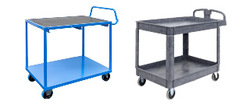
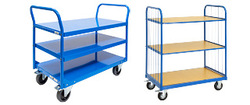
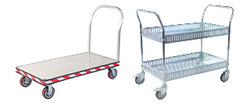
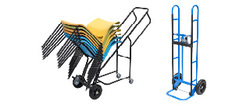
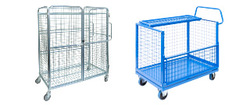
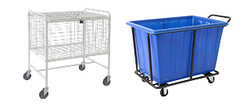
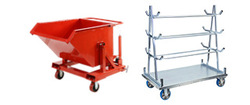
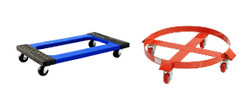
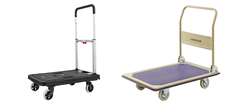
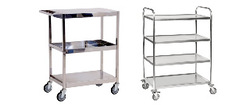
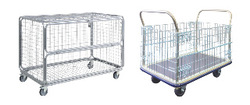
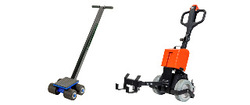
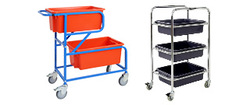
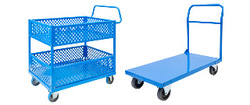
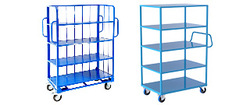
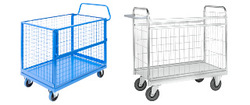
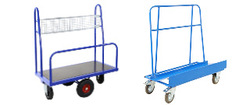
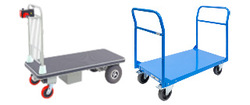
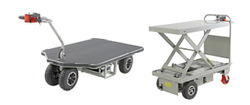
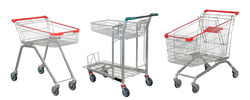
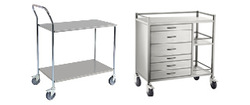
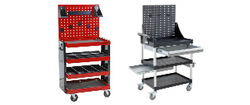
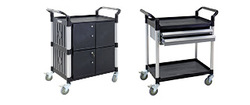
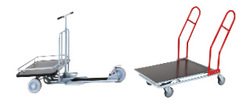
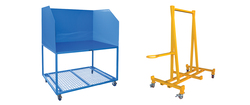



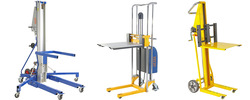



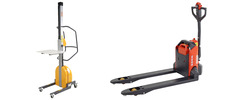
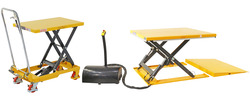
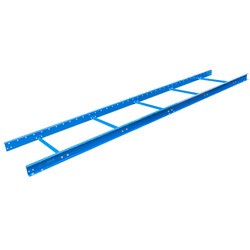
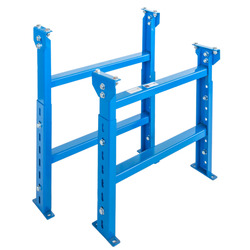
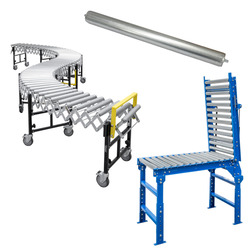
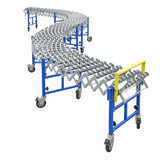


















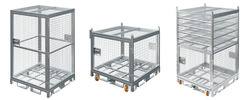

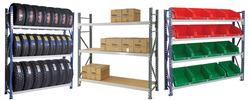
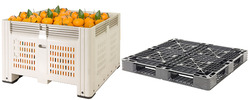
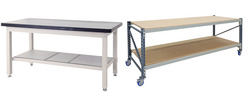
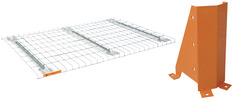
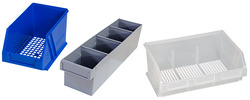

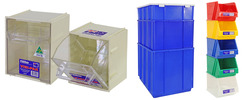

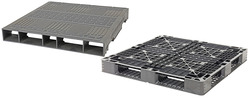

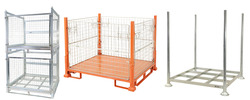
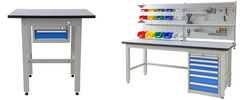
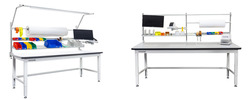


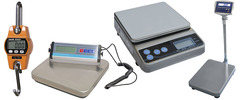



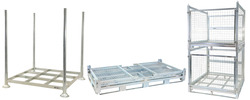
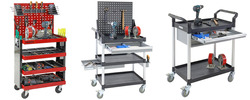
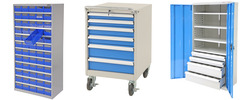

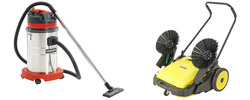











 Trolleys / Hand Trucks
Trolleys / Hand Trucks 2 Tier Trolleys
2 Tier Trolleys 3 Tier Trolleys
3 Tier Trolleys Aluminium Trolleys
Aluminium Trolleys Appliance & Hand Trucks
Appliance & Hand Trucks Cage Trolleys
Cage Trolleys Cleaning Carts & Trolleys
Cleaning Carts & Trolleys Construction Trolleys
Construction Trolleys Dollies
Dollies Foldable Trolleys
Foldable Trolleys Hospital Trolleys
Hospital Trolleys Laundry/Linen Trolleys
Laundry/Linen Trolleys Load Skates & Tow Tugs
Load Skates & Tow Tugs Mail / Office Trolleys
Mail / Office Trolleys Multi Purpose Trolleys
Multi Purpose Trolleys Multi-Tier Shelf Trolleys
Multi-Tier Shelf Trolleys Order Picking Trolleys
Order Picking Trolleys Panel Cart Trolleys
Panel Cart Trolleys Platform Trolleys
Platform Trolleys Powered Trolleys
Powered Trolleys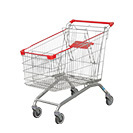 Shopping Trolleys
Shopping Trolleys Stainless Steel Trolleys
Stainless Steel Trolleys Tool Trolleys
Tool Trolleys Utility Carts
Utility Carts Warehouse Trolleys
Warehouse Trolleys Custom Trolleys
Custom Trolleys Lifting Equipment
Lifting Equipment Forklift Attachments
Forklift Attachments Jib Attachments
Jib Attachments Lifting Hoists & Pallet Hooks
Lifting Hoists & Pallet Hooks Manual Stackers & Lifters
Manual Stackers & Lifters Pallet Jacks
Pallet Jacks Pallet Lifters
Pallet Lifters Pallet Rotators & Dispenser
Pallet Rotators & Dispenser Powered Pallet Trucks & Electric Lifters
Powered Pallet Trucks & Electric Lifters Scissor Lift Trolleys and Tables
Scissor Lift Trolleys and Tables Conveyor Equipment
Conveyor Equipment Conveyor Frames
Conveyor Frames Conveyor Stands
Conveyor Stands Roller Conveyors
Roller Conveyors Skate Wheel Conveyors
Skate Wheel Conveyors Access Equipment
Access Equipment Container & Yard Ramps
Container & Yard Ramps Step Stools & Ladders
Step Stools & Ladders Work Platforms & Crane Cages
Work Platforms & Crane Cages Drum Handling
Drum Handling Drum Storage & Bunding
Drum Storage & Bunding Drum Trolleys & Lifters
Drum Trolleys & Lifters Forklift Drum Handling
Forklift Drum Handling Containment & Spillage
Containment & Spillage Aerosol Cans Storage Cages
Aerosol Cans Storage Cages Bunded Pallets & Storage
Bunded Pallets & Storage Corrosive Goods Storage Cabinets
Corrosive Goods Storage Cabinets Flammable Liquid Cabinets
Flammable Liquid Cabinets Forklift Gas Storage Cages
Forklift Gas Storage Cages Gas Cylinder Storage
Gas Cylinder Storage Site Storage
Site Storage Spill Kits
Spill Kits Stillage Cages
Stillage Cages Waste Handling
Waste Handling Bin Lifters & Tippers
Bin Lifters & Tippers Plastic Waste Bins and Carts
Plastic Waste Bins and Carts Steel Waste and Tipping Bins
Steel Waste and Tipping Bins Storage Equipment
Storage Equipment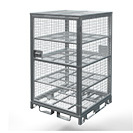 750 Series Cage Configurations
750 Series Cage Configurations Heavy Duty Cabinets & Benches
Heavy Duty Cabinets & Benches Heavy Duty Shelving
Heavy Duty Shelving Mega Bins & Pallets
Mega Bins & Pallets Packing Benches
Packing Benches Pallet Racking Accessories
Pallet Racking Accessories Parts Trays & Stor-Pak Bins
Parts Trays & Stor-Pak Bins Pegboard & Louvre Panels
Pegboard & Louvre Panels Plastic Bins
Plastic Bins Plastic Handling Solutions Bins
Plastic Handling Solutions Bins Plastic Pallets
Plastic Pallets Stack & Nest Bins
Stack & Nest Bins Storage Cages
Storage Cages Workplace Equipment
Workplace Equipment Workbenches
Workbenches Modular Workbenches
Modular Workbenches Electric Height-Adjustable Workbenches
Electric Height-Adjustable Workbenches Floor Matting
Floor Matting Industrial Weighing Scales
Industrial Weighing Scales Pallet Wrapping & Packaging Machinery
Pallet Wrapping & Packaging Machinery Ramps
Ramps Stationery Cupboards
Stationery Cupboards Storage and Stillage Cages
Storage and Stillage Cages Tool Trolleys
Tool Trolleys Tooling Cabinets
Tooling Cabinets Wheelie Bins
Wheelie Bins Workshop Equipment
Workshop Equipment Safety Equipment
Safety Equipment Gloves and PPE
Gloves and PPE Pallet Rack Post Protectors
Pallet Rack Post Protectors Safety Barriers & Bollards
Safety Barriers & Bollards Safety Knives & Cutters
Safety Knives & Cutters Signs and Traffic Supplies
Signs and Traffic Supplies Tool & First Aid Boxes
Tool & First Aid Boxes Construction Equipment
Construction Equipment Concrete Equipment
Concrete Equipment General Site Equipment
General Site Equipment Lifting Equipment
Lifting Equipment Site Storage
Site Storage Waste
Waste 










